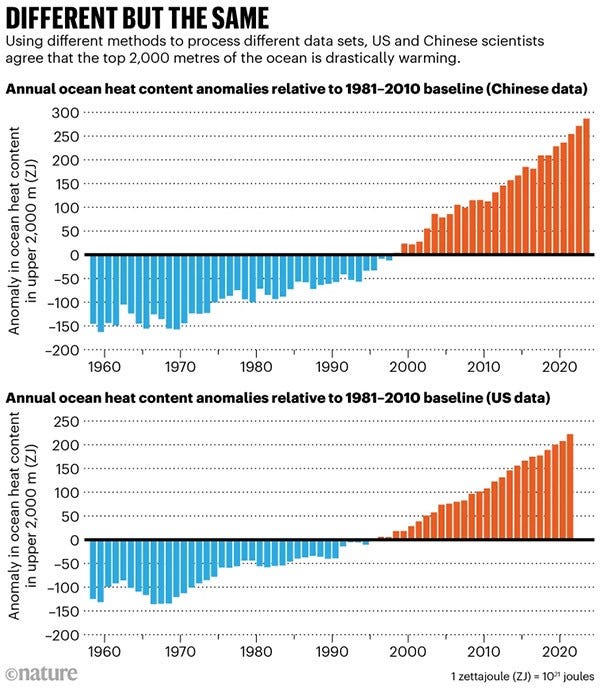It doesn’t happen often, but US and China are on the same page when it comes to assessing effects of climate change on the amount of energy stored in the world’s oceans.
The graphs below, as reported recently in Nature, show changes in heat content of the uppermost 2,000 metres over the last 70 years. As expected given record temperatures last year, the amount of heat transferred to the ocean in 2023 was also at an all-time high.
The two analyses differ in the details. The changes deduced by China are about 20 percent more than those deduced by the US group. But the pattern of increase is virtually identical. Both also show that the rate of change is getting faster and faster. The brown section of both plots is clearly steeper than the blue.
That amount of energy involved is large! In the last 25 years it has increased by around 250 zettajoules is (i.e., 2.5x1023 joules). That’s an increase of about 10 zettajoules per year (i.e., 1022 joules per year). By comparison, the Hiroshima bomb - one of mankind’s largest energy releases to that time - released about 1.5x1013 joules. Paltry in comparison. The amount taken up by the oceans last year because of increasing greenhouse gases was about a billion times greater! Take a second to imagine that …. In that second, the amount of energy absorbed by the oceans was equivalent to about 20 Hiroshima bombs.
According to these numbers at least. Other studies have come up with fewer equivalent bombs per second. But again, the message is the same. The excess amounts of energy we’re having to deal with because of increasing greenhouse gases is stupendously large. It’s not good enough to fiddle around the edges of the problem as we’ve done for the last 30 years.
Now that there’s agreement between the world’s two superpowers on the scale of the problem, perhaps progress on solving it will be faster.




The largest bomb exploded was 50Megaton (2e17 joules) TSAR bomb. Perhaps the heat not biggest issue, there are several more demons.
1. Increase CO2 in ocean increases acidity, we on threshold that coral and shell based sealife will not be capable of having hard shells.
2. Increased sea temperature decreases oxygen levels in water. Already dead zones in oceans due to lack of oxygen have grown much.
3. As deep ocean heats much from its 0C levels the layer of methane hydrate will be quickly released.
https://www.pnas.org/doi/10.1073/pnas.0800885105#:~:text=Much%20of%20the%20methane%20in,methanogenesis%20of%20buried%20organic%20matter.